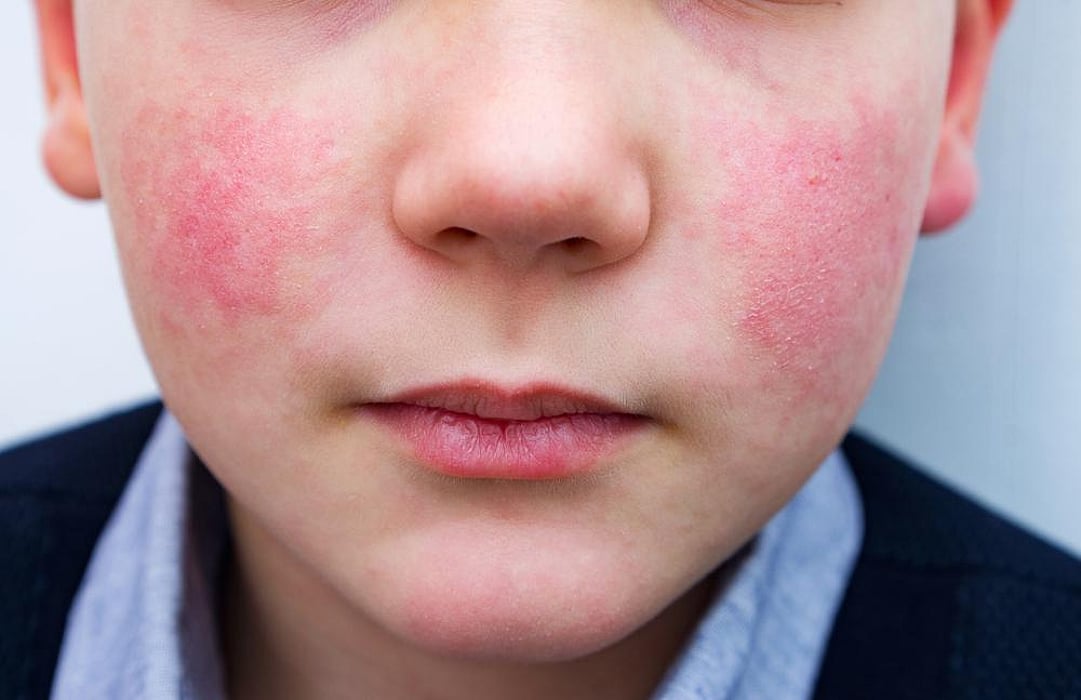Fifth Disease

What is fifth disease?
It's one of five common contagious childhood ailments that cause fever and a rash. After doctors figured out what to call measles, rubella, roseola, and scarlet fever, they apparently ran out of catchy names and called the fifth disease just that. Its technical name is erythema infectiosum, but the illness does have a more colorful moniker: "slapped-cheeks disease." That's because after the contagious period has passed, children with fifth disease often develop an angry red rash on their cheeks. This fades to a pink lacy pattern as it spreads to the torso, arms, thighs, and buttocks. Physical activity or bathing can worsen the rash, which may itch. Occasionally a child may have joint pain with the rash, requiring medical attention.
The actual illness precedes the rash by seven to 10 days and is usually so mild that parents barely take note of it. Its symptoms include a fever (usually below 103 degrees F) that may be accompanied by a headache, reddish eyes, fatigue, and a sore throat. In some cases, however, there are no symptoms at all.
If you catch fifth disease from your child, you may experience joint pain and swelling for as long as a few weeks. These symptoms can be dramatic, but they aren't permanent.
What causes fifth disease?
Fifth disease is the work of the human parvovirus, which can also cause arthritis. It's most common in children who are between the ages of 5 and 14, and it usually strikes during the late winter or early spring.
What should I do if my child gets fifth disease?
No medicine cures the illness; keeping your child at home and giving him plenty of fluids are the best treatments. An over-the-counter ointment like calamine lotion can soothe itching, and acetaminophen will cool a fever. (Don't use aspirin for this or any other viral illness in anyone under the age of 20; it could lead to a life-threatening condition known as Reye's syndrome.) By the time the rash appears, your child isn't contagious and can go to daycare or school without a problem.
Although fifth disease is generally a mild viral infection, it can be dangerous for a child who has sickle-cell anemia. In rare cases, it also can threaten the life of a fetus during the first half of pregnancy. If your child has both sickle-cell anemia and fifth disease, see your child's doctor immediately. If he simply has fifth disease (and is still contagious), keep him at home to avoid infecting pregnant women or other susceptible people. (In fact, if a youngster in his class or daycare facility has fifth disease, your child may already be infected. As long as he doesn't have a fever or other symptoms, you can continue to send him to school or daycare, but try to keep him from coming into contact with pregnant women.) Pregnant preschool teachers and daycare workers may want to know whether they've had the disease in the past; this can be accomplished through antibody testing.
Fifth disease usually runs its course in about 10 days. The rash may reappear for several weeks afterward, aggravated by sunlight, fever, heat, or even stress, but it doesn't signal a return of the ailment. Call your pediatrician if your child's fever lasts more than a few days or goes higher than 102 degrees F; another infection may be at fault.
Can fifth disease be prevented?
As is true of most infectious illnesses, the best way to maximize your child's chances of avoiding it is to make sure he washes his hands regularly and doesn't share cups or eating utensils.
References
Robert H. Pantell M.D., James F. Fries M.D., Donald M. Vickery M.D., Taking Care of Your Child: A Parent's Illustrated Guide to Complete Medical Care. Da Capo Lifelong Press.
Parvovirus B19 (Fifth Disease), Centers for Disease Control. http://www.cdc.gov/ncidod/dvrd/revb/respiratory/parvo_b19.htm
Nemours Foundation, KidsHealth.org. Fifth Disease. http://kidshealth.org/parent/infections/skin/fifth.html
Related Posts
Historic ‘Redlining’ of Neighborhoods Linked to Black Americans’ Rate of Kidney Failure
THURSDAY, July 6, 2023 (HealthDay News) -- Decades of “redlining” —...
Más mujeres con educación universitaria tienen hijos fuera del matrimonio
MARTES, 7 de septiembre de 2021 (HealthDay News) -- Primero viene el amor....
Severity Reduced With Mpox Reinfection, Postvaccination Infection
MONDAY, Sept. 11, 2023 (HealthDay News) -- The clinical features and outcomes of...
AHA News: Los vasos sanguíneos, y no solo las células cerebrales, pueden afectar la salud cerebral
LUNES, 3 de abril de 2023 (American Heart Association News) -- Las células...
